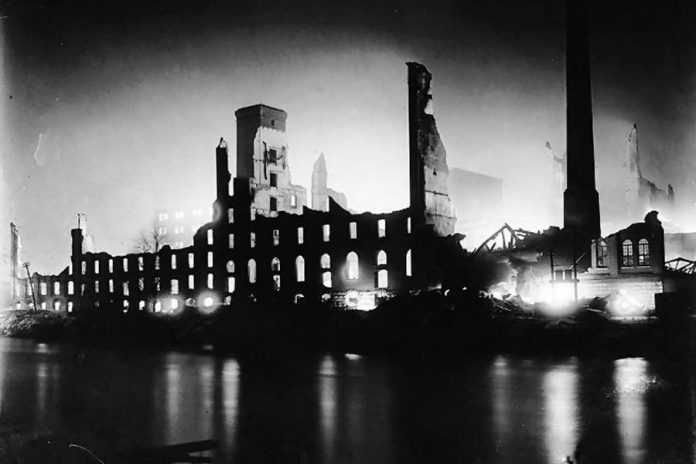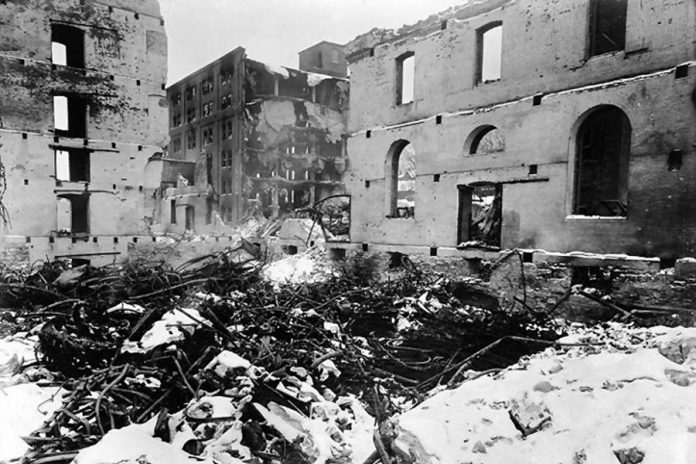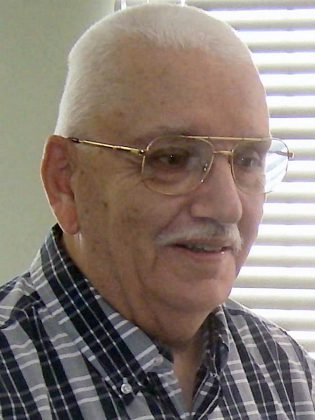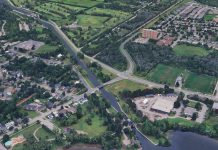
Sunday, December 11th will be the 100th anniversary of the explosion and fire at the Quaker Oats plant in Peterborough, and local historian Gord Young has written a new book about the 1916 disaster.
On December 11, 1916, a massive explosion and fire levelled the plant, killing 22 workers — two more would later die as a result of their injuries — and resulting in over $2 million in damages.
A Dark Day In Peterborough: A Time To Remember December 11, 1916 features a gripping you-are-there narrative along with numerous archival photographs and newspaper clippings.
Researched over 12 years by Young, with the assistance of several Lakefield Heritage Research volunteers, the book is the most comprehensive account yet published of the Quaker explosion and fire and its aftermath.

In more than 200 pages, the book also recounts the effects of the tragedy and investigates the many theories as to what caused the explosion.
It follows the production by Millbrook’s 4th Line Theatre this past summer of The Hero of Hunter Street, a historical play about the tragedy written by Dora-winning playwright Maja Ardaly.
A Dark Day In Peterborough: A Time To Remember December 11, 1916 will be officially launched at 1 p.m. on Friday, November 18th at the Peterborough Chamber of Commerce boardroom (175 George St. N., Peterborough).
The book is available for purchase for $30 at Chapters (873 Lansdowne St. W., Peterborough), The Canadian Canoe Museum (910 Monaghan Rd., Peterborough), Sullivan’s Pharmacy (71 Hunter St. E., Peterborough), Trent Valley Archives (567 Carnegie Ave., Peterborough), Happenstance Books and Yarns (44 Queen St., Lakefield), Lakefield IDA Pharmacy (32 Queen St., Lakefield), and at Craftworks at The Barn (124 Lindsay Rd., Selwyn).

An excerpt from A Dark Day In Peterborough: A Time To Remember December 11, 1916
After observing the Lord’s Day Act (1906), which insisted that work be halted between Saturday night at midnight and could only be resumed at 7 a.m. on Monday, the Quaker plant had been humming along in full production Monday, December 11, 1916 as it should have been, given the massive wartime contracts it had with England, the UK Army and Canadian Expeditionary Forces in France.
According to the testimony of day duty Waterworks Supervisor Ross L. Dobbin, the low water pressure alarm on the Hunter Street East main began ringing loudly at about 10:10 a.m. as he watched the pressure drop from 70 pounds to 45 pounds and then return to 70 pounds. He logged the time at 10:13 a.m.
He then picked up the phone which connected the water plant to the City Hall clerk’s phone and the fire department on Aylmer Street simultaneously. Records later entered showed that the clerk’s office received the plant operator’s call at 10:14 a.m., as did the fire station’s day-duty watchman’s log.
Fire box alarm bells rang in the Aylmer Street Fire Station and at City Hall.
Mayor J. J. Duffus was called at his Ford auto dealership (at 195 Simcoe Street) and the other city aldermen are called. This was at 10:15 a.m or thereabouts.
Even the clerk’s office realized that there must be a problem at the Quaker plant just by knowing where the fire alarm boxes were. Soon these three alarm boxes, which were just inside the Quaker property (one at the end of Brock Street, the other at the end of Murray Street and another at the end of London Street), were all ringing. Thus no one had to be told it was serious.
Whether the public fire alarm box at the front of the Quaker plant on Hunter Street East was pulled is uncertain.
Recently retired firefighters were called but, sadly, the one man who could have helped, retired fire chief Thomas Rutherford, was now dead.
About the author

Gord Young regularly contributes to The Heritage Gazette published by Trent Valley Archives and served as the co-ordinating editor of Lakefield – A Look Back At Its Heritage published in 1998.
With Lakefield Heritage Research, he has written three historical papers: “The 100th Anniversary of the Peterborough Lift Lock”, “The 100th Anniversary of King George Public School”, and “The 75th Anniversary go Queen Elizabeth School”.
Young served on the Peterborough Architectural Conservancy Advisory Committee as well as committees for the 100th anniversary of the Peterborough Lift Lock and the 90th anniversary of the Quaker explosion and fire. The latter volunteer position saw him play a lead role in having a memorial plaque erected in the vicinity of the Quaker plant.
In recognition of his work in area of local historical research, Young has received two Civic Awards, an award from the Peterborough Historical Society, and a Trent University 50th Anniversary Writing Award.


























